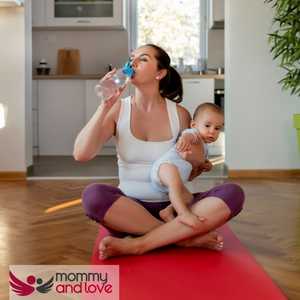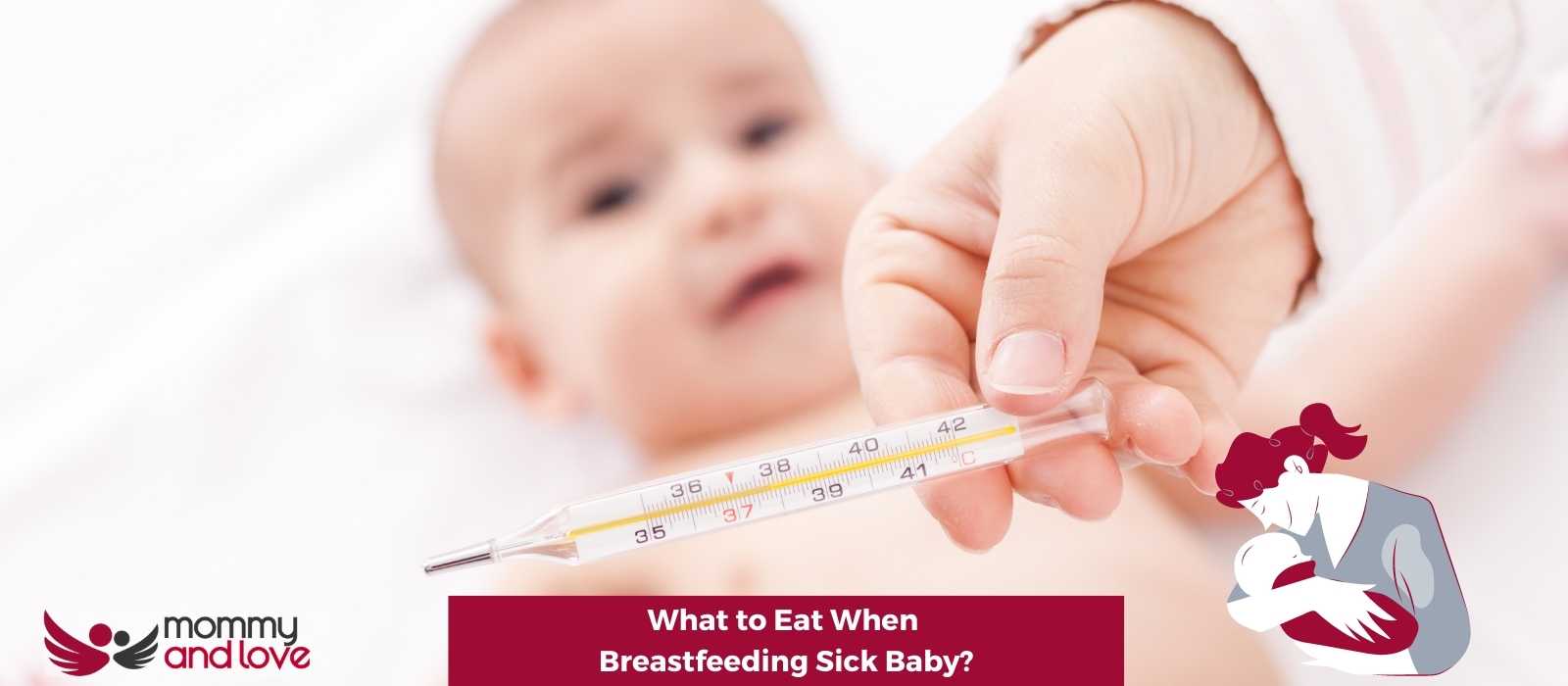When your baby is sick, you want to do everything possible to make them feel better. Breastfeeding is one of the best things you can do for your baby when they are not feeling well. Mother’s milk is more than just milk!
Breastfed babies have less episodes of diarrhea and vomiting, and are less likely to develop respiratory illnesses. This is because the milk supply provides antibodies and other vital nutrients.
Tip on Foods to Eat When Breastfeeding A Sick Baby

However, you may be wondering if your diet matters when you are breastfeeding a sick baby. The answer is yes – what you eat can affect your baby’s health.
If your baby is sick, it is important to focus on foods that will help them feel better. Here are some tips for what to eat when breastfeeding a sick baby:
• Eat plenty of fluids. Drink water, juice, and soups to stay hydrated.
• Eat foods that are easy to digest. Stick to simple meals like broth, toast, bananas, and applesauce.
• Avoid caffeine and dairy products. These can aggravate diarrhea and vomiting.
• Include probiotics in your diet. Probiotics can help to improve your baby’s intestinal health.
You can also tailor your foods depending on their ailment.
Breastfeeding a Congested Baby
There are a few things that you can do to help a congested baby. One is to make sure they drink plenty of fluids, as this will help loosen the mucus. You should eat warm liquids like chicken soup or warm water with honey. Another thing you can do is use a humidifier in their room, which will help loosen the mucus and make it easier to breathe. And finally, you can use a nasal aspirator to help clear the mucus from their nose.
Breast milk increases mucus production and helps clear it from baby’s nasal passages. If breastfeeding, continue to do so. You can also use saline drops and a bulb syringe to clean baby’s nose.
Breastfeeding a baby with a sore throat

There are a few different things you can eat to help soothe a sore throat.
Foods that are high in vitamins C and A, such as oranges, grapefruit, and carrots, can help to boost your immune system and fight off any infection that may be causing your sore throat.
Other good options include chicken soup, which can help toloosen up mucus and soothe the throat, and warm honey lemon tea, which can help to relieve pain and inflammation. If you are struggling to eat solid foods, try drinking smoothies or juice instead.
Whilst you are ingesting all of these when the baby nurses all the goodness flows into mom’s milk and will help baby recovers. Human milk changes depending on what you eat
Breastfeeding a baby with an earache
There are a few things that you can eat to help relieve an earache. One is garlic, which can be eaten raw or cooked. Garlic contains allicin, which is known for its anti-inflammatory and antibacterial properties. Another option is onion, which also has anti-inflammatory and antibacterial properties. You can eat it raw or cooked. Lastly, you can eat ginger, which is a natural anti-inflammatory and analgesic. It can be eaten fresh, dried, or in supplement form. Try incorporating one of these foods into your diet to help relieve your baby’s earache.
The benefit of breast milk over formula fed babies is that the milk supply will change depending on what you re eating. On top of keeping baby hydrated their nutritional requirements will change and this can be provided through breast milk.
It is important that you don’t stop breastfeeding, and if baby refuses to nurse then you can give expressed milk via a dropper.
Tell me the best way to breastfeed a sick baby?
Sucking is soothing for babies and can help them feel better. So if your baby is sick, continue to breastfeed them as much as possible. The antibodies in your milk will help your baby get better faster. If your baby is having trouble breastfeeding because of their illness, try to get help from a lactation consultant or your doctor. They can give you advice on how to make breastfeeding easier for both you and your baby.
Remember, the most important thing is to keep breastfeeding your baby as much as possible. The antibodies in your milk will help them get better faster.
Should I breastfeed my sick child?
Yes, you should continue to breastfeed your sick child. Breastfeeding provides your child with antibodies that help them fight off infection. It is also soothing for babies and can help them feel better. Breastfeeding your sick child also helps keep them hydrated. If you are unable to breastfeed your child, you can give them oral rehydration therapy or formula.
An ill baby will benefit as your body makes antibodies it passes it on to them through breast milk.
Breastfeeding a baby who is vomiting or has diarrhea
If your baby is vomiting or has diarrhoea, you may be wondering if you should continue breastfeeding. The answer is yes – you can and should continue breastfeeding your baby.
Breastfeeding is still the best way to feed your baby and will help keep them hydrated.
If your baby is very sick, they may not want to breastfeed. In this case, you can offer them an oral rehydration solution (ORS) through a dropper or spoon. ORS can be bought at most pharmacies. If your baby is refusing all food and drink, they may need to be admitted to hospital for treatment.
If you are finding it difficult to continue breastfeeding because of your baby’s illness, please speak to a health professional for advice. They will be able to help you continue breastfeeding while your baby is sick.
Is it okay to take medicines while breastfeeding?
There are many medicines available over-the-counter that can be safely taken while breastfeeding. However, it is always best to speak to your health professional before taking any new medication. They will be able to advise you on the safest way to take your medication while breastfeeding.
If you are taking a course of antibiotics, it is important to continue breastfeeding. Breastfeeding helps to build up your baby’s immunity and will help them recover from the infection.
If you are ever in doubt about whether or not a particular medicine is safe to take while breastfeeding, please speak to your health professional.
Tips for Breastfeeding a Sick Baby
If your baby is sick, you may be wondering if you should continue breastfeeding. The answer depends on the illness and how it affects your baby. In most cases, it is safe to continue breastfeeding. However, there are a few things you can do to make breastfeeding a sick baby easier:
1. Make sure your baby is drinking enough fluids.
2. Keep breastfeeding as often as your baby wants to nurse.
3. Avoid dairy products if your baby has diarrhea.
4. If your baby is vomiting, try feeding them in a more upright position.
5. If your baby has a fever, keep them cool and comfortable.
6. If your baby is on antibiotics, continue breastfeeding unless the doctor tells you otherwise.
7. If your baby is sick and you are not sure if you should continue breastfeeding, talk to your doctor.
Breastfeeding a sick baby can be tricky, but it is definitely worth trying to continue nursing as often as possible. The benefits of breastfeeding a sick baby include increased immunity, reduced risk of infection, and better overall health. So don’t give up on breastfeeding just because your baby is a little under the weather – it can still provide them with lots of benefits.
What can I eat to help my breastfed baby with a cold?
There are a few things that breastfeeding mothers can eat to help their babies with colds. Some good foods to eat include chicken soup, ginger tea, and garlic. It is also important to drink plenty of fluids while you are breastfeeding. This will help to keep you hydrated and will help to loosen up any mucus in your baby’s throat. If your baby is older than six months, you can also give them ibuprofen to help relieve any pain or inflammation.
If your baby is having trouble breastfeeding because of a cold, you may also want to try using a nipple shield. A nipple shield is a thin piece of silicone that fits over the nipple and helps to keep the baby’s mouth in the correct position. This can help to make breastfeeding more comfortable for both you and your baby.
You can continue to do other treatments for ear infections or a cold like a hot shower to clear baby’s nostrils, saline nose drops and other over the counter medication for the common cold. A steamy bathroom will help clear congestion.
Do babies nurse more when sick?
It’s a common question that new parents have: do babies nurse more when they’re sick? The answer, unfortunately, is a little bit complicated.
On one hand, it’s true that babies will often nurse more when they’re feeling sick. This is because they’re trying to get all the nutrients and antibodies they can to help them fight off the illness. And its important that baby continues to nurse, especially if they have stopped eating solids.
On the other hand, babies may also nurse more when they’re sick because they’re uncomfortable and want to feel better. So it’s hard to say for sure whether nursing is actually helping the baby get better or not. But breast milk is rapidly digested and as your baby sleeps the antibodies passed to them in human milk will help them fight the tummy upset or runny nose, ear infection or whatever ailment they make have.
There are a few things that you can do to help your baby get better when they’re sick. Make sure that they’re drinking plenty of fluids, both from nursing and from drinking water or other liquids.
Does breastmilk help fight colds?
The answer to this question is a bit of a mixed bag. Some studies suggest that breastmilk can help fight off colds, while other studies are not so sure. The jury may still be out on this one, but there are some potential benefits of breastmilk when it comes to fighting off colds.
One potential benefit of breastmilk when it comes to fighting off colds is that it can help boost the immune system. Breastmilk contains all sorts of nutrients and antibodies that can help strengthen the immune system and fight off infection.
Another potential benefit of breastmilk when it comes to fighting off colds is that it can help keep nasal passages moist. This is important, because a moist nasal passage is less likely to become infected.
Finally, breastmilk is a natural source of fluids, and it can help keep you hydrated during a cold.
How do you breastfeed a baby with a stuffy nose?
It can be difficult to breastfeed a baby with a stuffy nose because they may have difficulty breathing and swallowing. In some cases, you may need to express milk into a bottle and feed it to your baby that way. Here are a few tips for breastfeeding a baby with a stuffy nose:
• Make sure your babyis in a comfortable position. If your baby is uncomfortable, they may be less likely to nurse.
• Keep a cool, damp cloth near you to help clear your baby’s nose.
• Gently suction your baby’s nose if necessary.
• Breastfeed frequently and for as long as possible. This will help keep your baby’snasal passages clear.
Take Away on breastfeeding baby with cold
Eat the foods that you would if you were sick as all the nutrients and goodness will pass to them through mothers milk. So honey for sore throats, garlic for a cold. Even if you are feeling sick yourself you should still be able to produce enough milk to help them.
Keep up the great work mama!

This article was written by Sandra Baker – full time writer and the mother of four amazing kids (including twins!)
She’s also a breastfeeding counselor and has spent years helping new parents learn how to care for their children. When she’s not writing or caring for her children, Sandra likes to spend time reading and taking walks with her husband.




